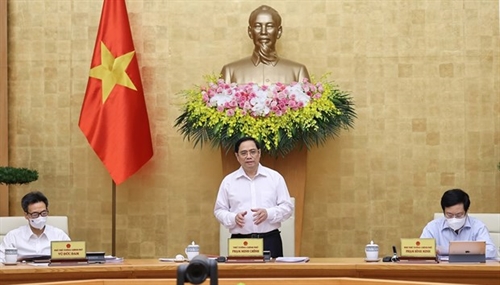All resources and the entire political system of Vietnam will be mobilized to develop an e-government in 2021, and eventually form a digital government by 2025.
Such is provided under Prime Minister Decision 924/QD-TTg dated June 15, promulgating the strategy for development of e-government and digital government in the 2021-25 period, with a vision toward 2030.
 |
| Representatives attend a ceremony to launch the National Reporting System and the Government Operations Center on August 19, 2020__Photo: VNA |
Accordingly, the country’s first-ever digital government strategy sets forth five groups of targets to be achieved by 2025, including providing high-quality services to the community; mobilizing the people’s engagement; optimizing state agencies’ operations; effectively addressing strategic issues during socio-economic development; and waging a breakthrough in the country’s ranking in e-government development.
Specifically, by 2025, it is targeted that Vietnam will be ranked among top 50 countries in the world regarding digital government, e-participation and open data in accordance with the United Nations ranking, and among the top 30 by 2030.
Under the strategy, with the development of an e-government and eventually digital government, people and enterprises will be provided with digital services in a convenient and simple way without having to show up at government agencies or submit paper documents.
Every citizen will have a token together with a QR code which can be activated on a smart phone, while every household will have its digital address and capable of accessing the broadband Internet.
Every citizen will hold a digital personal health profile and all commune-level health establishments will be able to manage their operations on the digital environment and consequently provide outreach medical examination and treatment services based on actual demands of patients.
Public hospitals and medical centers may use electronic medical profiles, receive cashless payment of medical costs and make electronic prescriptions.
Students will have digital records of their studies, while schools will be able to organize online classes, receive cashless payments and provide digital learning materials.
At the same time, state agencies will have their organizational models and operation methods re-designed based on data and digital technology in order to create better working environment and instruments for their officials and employees to better perform their jobs, coordinate with one another more effectively, make more timely decisions, formulate better policies, and use resources more optimally.
To realize these goals, the Government sets out several key tasks, including improving a comprehensive legal framework, developing digital infrastructure and platforms, and a national database system, applying new services and apps, and take measures to ensure national cyber-security.
In the immediate future, national databases on basic and essential services for people, enterprises and state agencies would be a top priority, particularly a database on land, citizens and enterprises.
It is also targeted to develop a national public portal, the only address for citizens and enterprises to get access to all online public services provided by ministries, sectors and localities.- (VLLF)









